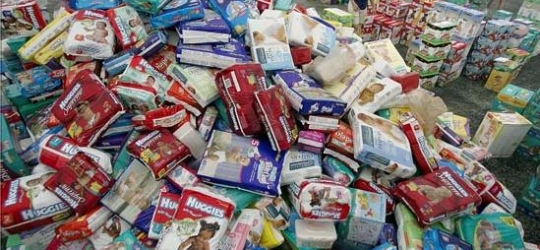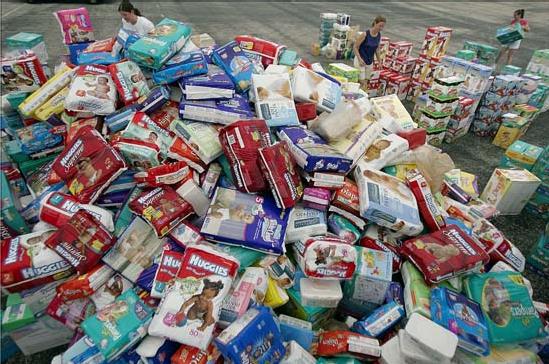
Plastic Free Baby Journal #2: Getting to the bottom of diapers
Posted on April 8, 2012 by DrRossH in Plastic Waste News
Plastic Free Baby Journal #2: Getting to the bottom of diapers | 5 Gyres.
Not to comment on how to raise kids and diapers as I do not know much about either. What I do know a bit about is plastics or more properly their disposal issues.
There are some fairly recent new additives that can be added to conventional plastics to make them become biodegradable in a landfill. Unlike compostable plastics that require a special facility to biodegrade which makes compostable plastics a non starter as very few people can get them to a such a facility. If you put compostable plastics in landfill they do not biodegrade. If you put them in your home compost pile they do not biodegrade either most of the time. This is because for a compostable plastic to biodegrade it has to reach over 60 deg C and have lots of oxygen and moisture. If it doesn’t get those conditions the compostable plastic will not biodegrade. As implied above compostable diapers are more of a ‘green washing’ sales point as the do nothing on the disposal side really. Except that comment by Jen, that sounds like a great service.
On the other hand landfill biodegradable plastics will simply biodegrade in a landfill as long as there is moisture around for the microorganisms to live on. For an example of an additive manufacture of these landfill biodegradable additives do a Google search for Ecopure or Eco-One. Once a diaper manufacturer realises they can make disposable diapers that will naturally biodegrade in a landfill, they will kick themselves for not doing this sooner. This is a huge hole in the market.
While reusing cloth diapers would seem to be the best solution still, for those that feel they have to have disposable diapers, then when they start to be made with a landfill biodegradable plastic you will still be able to feel confident that you are throwing away plastic that is going to be gone in a year or so and not persist for 100’s of years like regular disposable diapers do now.

 How many people today grab a takeaway coffee cup from the local cafe to drink on the go? We don’t know, but the number must be enormous.. Most every one of the above have a plastic top that will last 100s of years. Some cafes still use plastic cups that last a similar time. Is 10 minutes of coffee worth 100s of years of trash?
These items can be seen littering our gutters and on our streets all over the place. If they were all cardboard, they would still be littered, but they would, at least, be gone in a short time.
They do not need to be made of plastic.
How many people today grab a takeaway coffee cup from the local cafe to drink on the go? We don’t know, but the number must be enormous.. Most every one of the above have a plastic top that will last 100s of years. Some cafes still use plastic cups that last a similar time. Is 10 minutes of coffee worth 100s of years of trash?
These items can be seen littering our gutters and on our streets all over the place. If they were all cardboard, they would still be littered, but they would, at least, be gone in a short time.
They do not need to be made of plastic.
 On the way home from the gym last week, a distance of about 1 km (1/2 mile), I counted the items of plastic litter on the curb as I walked. In that short distance I counted 63 pieces of plastic litter. Plastic drink bottles, bottle tops, candy wrappers, plastic film, polystyrene fragments etc. That seemed to be a lot to me. I guess it is a generational thing. Our parents would have been horrified to see that amount, whereas it seems to go unnoticed by our youth of today. In another 20 years how many pieces will there be on this stretch, -- 200? What will today’s youth think of that new amount then when they are older? Will their children be so readily accepting of a higher amount of litter?
On the way home from the gym last week, a distance of about 1 km (1/2 mile), I counted the items of plastic litter on the curb as I walked. In that short distance I counted 63 pieces of plastic litter. Plastic drink bottles, bottle tops, candy wrappers, plastic film, polystyrene fragments etc. That seemed to be a lot to me. I guess it is a generational thing. Our parents would have been horrified to see that amount, whereas it seems to go unnoticed by our youth of today. In another 20 years how many pieces will there be on this stretch, -- 200? What will today’s youth think of that new amount then when they are older? Will their children be so readily accepting of a higher amount of litter? 
Discussion · No Comments
There are no responses to "Plastic Free Baby Journal #2: Getting to the bottom of diapers". Comments are closed for this post.Oops! Sorry, comments are closed at this time. Please try again later.